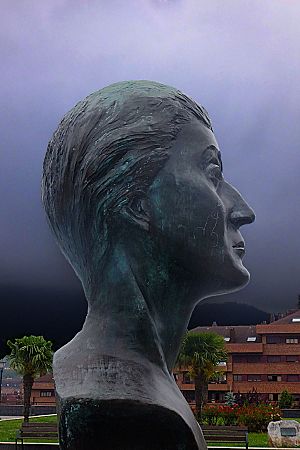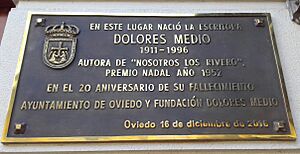Dolores Medio facts for kids
Quick facts for kids
Dolores Medio
|
|
|---|---|
 |
|
| Born |
María Dolores Medio Estrada
16 December 1911 Oviedo, Spain
|
| Died | 16 December 1996 (aged 85) Oviedo, Spain
|
| Other names | Amaranta |
| Occupation | Writer |
| Awards | Premio Nadal (1952) |
María Dolores Medio Estrada (born December 16, 1911 – died December 16, 1996) was an important Spanish writer. She won a big award called the Premio Nadal in 1952 for her book Nosotros, los Rivero. She is often seen as part of a special group of writers known as the Generation of '36.
Who Was Dolores Medio?
Dolores Medio first studied to become a teacher. She worked as a teacher in a town called Nava, Asturias. In 1945, she won a writing contest with a story that was later published in 1988.
After winning the contest, she moved to Madrid. There, she wrote for a magazine using the pen name Amaranta. She also studied journalism. She kept teaching for a while, but in 1952, everything changed. She won the famous Premio Nadal for her novel Nosotros, los Rivero. This success allowed her to stop teaching and become a full-time writer. She became a very popular author.
In 1963, Dolores Medio started a series of three books called Los que vamos a pie. The first book, Bibiana, shared her own life experiences. It even talked about a time she was involved in a protest that led to her being in prison. She wrote more about this experience in another book called Celda común. She also won another prize, the Premio Sésamo, for her book Andrés.
Her trilogy continued with La otra circunstancia in 1972. In 1982, she published El urogallo. This story was actually written much earlier, between 1936 and 1939. However, it could not be published until later because of strict government rules about what could be printed.
Dolores Medio wrote many other novels. Some of them include Funcionario público (1956), El pez sigue flotando (1959), Diario de una maestra (1961), Farsa de verano (1974), and El fabuloso imperio de Juan sin Tierra (1981).
She was a key writer in Spain who focused on "social literature." This means her books often explored real-life issues and society. She was very well-known in the 1950s and 1960s.
Later Life and Legacy
In 1981, Dolores Medio created the Dolores Medio Foundation. She gave all her money and property to this foundation. The foundation now gives out a special award called the "Asturias" Novel Prize.
In 1988, she moved back to her hometown, Oviedo. The city had honored her by naming her their "Favorite Daughter." She also received the Asturias Silver Medal. In 1992, many women's groups in Asturias held a special event to celebrate her life and work.
In 2003, the Oviedo City Council decided to create a statue in her honor. This bronze statue, made by Javier Morrás, stands in a square named after her, Plaza de Dolores Medio.
On December 16, 2016, exactly 20 years after she passed away, Oviedo honored her again. They placed a plaque on the house where she was born. A city historian, Carmen Ruiz-Tilve, spoke about Dolores Medio's life at the event.
In 2017, a new edition of her famous book Nosotros, los Rivero was released. This new version brought back the original text of the book. It had been changed before because of government censorship during the time of Francoist Spain. The new edition includes a special introduction that explains how the book was censored and how Dolores Medio fought to get it published.
Books by Dolores Medio
- Nina (1946)
- El milagro de la noche de Reyes (1948)
- Nosotros, los Rivero (1953)
- Compás de espera (1954)
- Mañana (1954)
- Funcionario público (1956)
- El pez sigue flotando (1959)
- Diario de una maestra (1961)
- Bibiana (1963)
- El señor García (1966)
- Biografía de Isabel II de España (1966)
- Andrés (1967)
- Guía de Asturias (1968)
- Selma Lagerlöf (1971)
- La otra circunstancia (1972)
- Farsa de verano (1973)
- El bachancho (1974)
- El fabuloso imperio de Juan sin Tierra (1977)
- Atrapados en la ratonera: Memorias de una novelista (1980)
- El urogallo (1982)
- La última Xana: narraciones asturianas (1986)
- Oviedo en mi recuerdo (1990)
- En el viejo desván (Memorias) (1991)
- ¿Podrá la ciencia resucitar al hombre? (1991)
- Celda común (1996)
See also
 In Spanish: Dolores Medio para niños
In Spanish: Dolores Medio para niños


